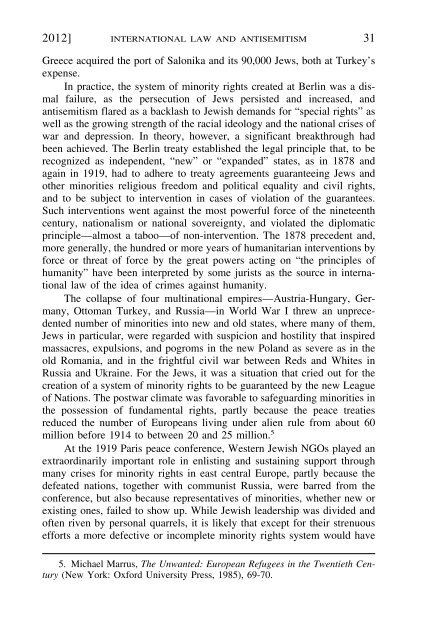Volume 4 No 1 - Journal for the Study of Antisemitism
Volume 4 No 1 - Journal for the Study of Antisemitism
Volume 4 No 1 - Journal for the Study of Antisemitism
You also want an ePaper? Increase the reach of your titles
YUMPU automatically turns print PDFs into web optimized ePapers that Google loves.
2012] INTERNATIONAL LAW AND ANTISEMITISM 31<br />
Greece acquired <strong>the</strong> port <strong>of</strong> Salonika and its 90,000 Jews, both at Turkey’s<br />
expense.<br />
In practice, <strong>the</strong> system <strong>of</strong> minority rights created at Berlin was a dismal<br />
failure, as <strong>the</strong> persecution <strong>of</strong> Jews persisted and increased, and<br />
antisemitism flared as a backlash to Jewish demands <strong>for</strong> “special rights” as<br />
well as <strong>the</strong> growing strength <strong>of</strong> <strong>the</strong> racial ideology and <strong>the</strong> national crises <strong>of</strong><br />
war and depression. In <strong>the</strong>ory, however, a significant breakthrough had<br />
been achieved. The Berlin treaty established <strong>the</strong> legal principle that, to be<br />
recognized as independent, “new” or “expanded” states, as in 1878 and<br />
again in 1919, had to adhere to treaty agreements guaranteeing Jews and<br />
o<strong>the</strong>r minorities religious freedom and political equality and civil rights,<br />
and to be subject to intervention in cases <strong>of</strong> violation <strong>of</strong> <strong>the</strong> guarantees.<br />
Such interventions went against <strong>the</strong> most powerful <strong>for</strong>ce <strong>of</strong> <strong>the</strong> nineteenth<br />
century, nationalism or national sovereignty, and violated <strong>the</strong> diplomatic<br />
principle—almost a taboo—<strong>of</strong> non-intervention. The 1878 precedent and,<br />
more generally, <strong>the</strong> hundred or more years <strong>of</strong> humanitarian interventions by<br />
<strong>for</strong>ce or threat <strong>of</strong> <strong>for</strong>ce by <strong>the</strong> great powers acting on “<strong>the</strong> principles <strong>of</strong><br />
humanity” have been interpreted by some jurists as <strong>the</strong> source in international<br />
law <strong>of</strong> <strong>the</strong> idea <strong>of</strong> crimes against humanity.<br />
The collapse <strong>of</strong> four multinational empires—Austria-Hungary, Germany,<br />
Ottoman Turkey, and Russia—in World War I threw an unprecedented<br />
number <strong>of</strong> minorities into new and old states, where many <strong>of</strong> <strong>the</strong>m,<br />
Jews in particular, were regarded with suspicion and hostility that inspired<br />
massacres, expulsions, and pogroms in <strong>the</strong> new Poland as severe as in <strong>the</strong><br />
old Romania, and in <strong>the</strong> frightful civil war between Reds and Whites in<br />
Russia and Ukraine. For <strong>the</strong> Jews, it was a situation that cried out <strong>for</strong> <strong>the</strong><br />
creation <strong>of</strong> a system <strong>of</strong> minority rights to be guaranteed by <strong>the</strong> new League<br />
<strong>of</strong> Nations. The postwar climate was favorable to safeguarding minorities in<br />
<strong>the</strong> possession <strong>of</strong> fundamental rights, partly because <strong>the</strong> peace treaties<br />
reduced <strong>the</strong> number <strong>of</strong> Europeans living under alien rule from about 60<br />
million be<strong>for</strong>e 1914 to between 20 and 25 million. 5<br />
At <strong>the</strong> 1919 Paris peace conference, Western Jewish NGOs played an<br />
extraordinarily important role in enlisting and sustaining support through<br />
many crises <strong>for</strong> minority rights in east central Europe, partly because <strong>the</strong><br />
defeated nations, toge<strong>the</strong>r with communist Russia, were barred from <strong>the</strong><br />
conference, but also because representatives <strong>of</strong> minorities, whe<strong>the</strong>r new or<br />
existing ones, failed to show up. While Jewish leadership was divided and<br />
<strong>of</strong>ten riven by personal quarrels, it is likely that except <strong>for</strong> <strong>the</strong>ir strenuous<br />
ef<strong>for</strong>ts a more defective or incomplete minority rights system would have<br />
5. Michael Marrus, The Unwanted: European Refugees in <strong>the</strong> Twentieth Century<br />
(New York: Ox<strong>for</strong>d University Press, 1985), 69-70.














